-
 Bitcoin
Bitcoin $92,488.1281
-3.27% -
 Ethereum
Ethereum $2,511.0854
-7.98% -
 Tether USDt
Tether USDt $1.0003
-0.01% -
 XRP
XRP $2.3119
-7.75% -
 BNB
BNB $611.3342
-5.36% -
 Solana
Solana $141.7338
-12.34% -
 USDC
USDC $1.0000
0.01% -
 Dogecoin
Dogecoin $0.2129
-7.98% -
 Cardano
Cardano $0.6889
-7.50% -
 TRON
TRON $0.2436
0.25% -
 Chainlink
Chainlink $15.3355
-9.20% -
 Stellar
Stellar $0.3007
-6.73% -
 Avalanche
Avalanche $21.9423
-9.10% -
 Sui
Sui $2.8704
-13.44% -
 Litecoin
Litecoin $115.5606
-5.55% -
 Toncoin
Toncoin $3.4426
-7.68% -
 Hedera
Hedera $0.1994
-2.91% -
 Shiba Inu
Shiba Inu $0.0...01392
-7.39% -
 UNUS SED LEO
UNUS SED LEO $8.8301
-9.44% -
 MANTRA
MANTRA $8.0217
-5.20% -
 Polkadot
Polkadot $4.4432
-7.67% -
 Hyperliquid
Hyperliquid $19.0104
-15.23% -
 Ethena USDe
Ethena USDe $1.0000
0.00% -
 Bitcoin Cash
Bitcoin Cash $295.5771
-7.40% -
 Bitget Token
Bitget Token $4.6978
-5.65% -
 Dai
Dai $0.9998
-0.01% -
 Uniswap
Uniswap $8.0169
-8.52% -
 Monero
Monero $228.8619
-2.97% -
 NEAR Protocol
NEAR Protocol $3.0482
-8.33% -
 Pepe
Pepe $0.0...07993
-11.71%
How do I track my Polymath (POLY) coin transactions?
To track your Polymath (POLY) coin transactions, you can utilize blockchain explorers like Etherscan, connect your MetaMask wallet, employ a hardware wallet for enhanced security, or monitor transaction fees on gas fee estimators.
Dec 31, 2024 at 03:52 pm
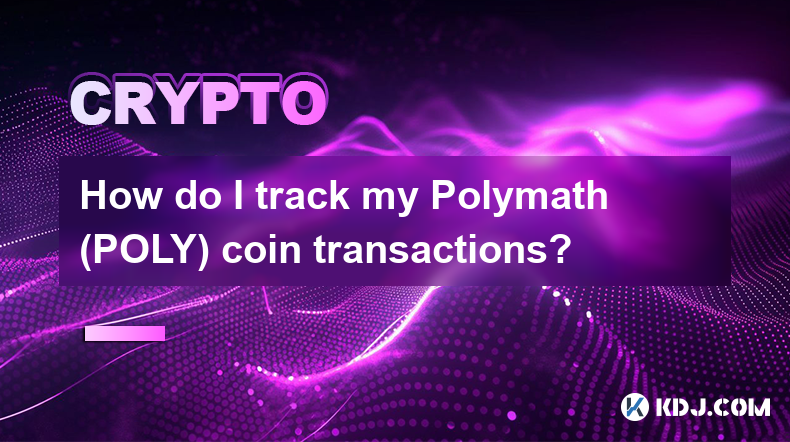
Comprehensive Guide to Tracking Polymath (POLY) Coin Transactions
Polymath (POLY) is an Ethereum-based platform that enables the creation and issuance of security tokens. Tracking Polymath transactions is crucial for managing your investments and understanding the movement of your POLY coins. This article provides a step-by-step guide on how to effectively track your Polymath coin transactions.
Key Points:
- Utilize a blockchain explorer for transaction details.
- Connect your MetaMask wallet for detailed transaction history.
- Use a hardware wallet for enhanced security and offline tracking.
- Understand the different transaction statuses for POLY.
- Monitor transaction fees and plan accordingly.
Detailed Instructions:
1. Utilize a Blockchain Explorer:
A blockchain explorer is a website or tool that allows you to view and search blockchain transactions. For Polymath transactions, you can use the following explorers:
- Etherscan: https://etherscan.io/
- Blockscout: https://blockscout.com/poly/mainnet/
- PolygonScan: https://polygonscan.com/
To track a Polymath transaction using a blockchain explorer, simply enter the transaction hash into the search bar. The explorer will provide you with detailed information about the transaction, including:
- Date and time of the transaction
- Sender and recipient addresses
- Amount of POLY transferred
- Transaction fee
- Transaction status
2. Connect Your MetaMask Wallet:
MetaMask is a popular cryptocurrency wallet that can be used to store and manage Polymath coins. By connecting MetaMask to a blockchain explorer like Etherscan, you can view your complete Polymath transaction history:
- Install MetaMask: Download and install the MetaMask browser extension or mobile app.
- Import Your Wallet: Import your existing wallet or create a new one.
- Connect to a Blockchain Explorer: Go to Etherscan or PolygonScan and click on the "Connect" button to connect your MetaMask wallet.
- View Transaction History: Once connected, you'll be able to view all Polymath transactions associated with your wallet address.
3. Use a Hardware Wallet:
Hardware wallets provide an enhanced level of security for storing and tracking cryptocurrencies. They are physical devices that store your private keys offline, making your funds less vulnerable to hacking. To track Polymath transactions using a hardware wallet:
- Acquire a Hardware Wallet: Purchase a hardware wallet from reputable manufacturers like Ledger or Trezor.
- Set Up Your Wallet: Follow the manufacturer's instructions to set up your wallet and create a seed phrase.
- Connect to a Blockchain Explorer: Connect your hardware wallet to a supported blockchain explorer like Etherscan.
- Import Your Wallet: Import your hardware wallet address into the explorer to view your Polymath transaction history.
4. Understand Transaction Statuses:
Polymath transactions can have various statuses, each indicating a different stage of the transaction process:
- Pending: The transaction is waiting to be confirmed by the network.
- Confirmed: The transaction has been processed and added to the blockchain.
- Failed: The transaction was unable to be completed due to insufficient funds, an invalid address, or other errors.
- Dropped: The transaction was submitted to the network but was not picked up by a miner for confirmation.
5. Monitor Transaction Fees:
Polymath transactions incur a fee known as "gas fees." These fees vary depending on network congestion and transaction size. It's important to monitor transaction fees before submitting a transaction to avoid unnecessary overspending. You can use a gas fee estimator like Etherscan's Gas Tracker to estimate the current gas fees for Polymath transactions.
Frequently Asked Questions (FAQs):
1. Can I track my Polymath transactions on my phone?
Yes, you can track your Polymath transactions on your phone using the MetaMask mobile app or by connecting your hardware wallet to a mobile-friendly blockchain explorer.
2. Is it safe to share my transaction hash with others?
Yes, transaction hashes are public and can be shared with others without compromising your security. A transaction hash is a unique identifier for a particular transaction on the blockchain.
3. Why is my Polymath transaction taking so long?
Transaction times can vary depending on network congestion and the complexity of the transaction. If your transaction is taking longer than usual, it's recommended to check the transaction status on a blockchain explorer.
4. What happens if I lose my private key?
If you lose your private key, you will permanently lose access to your Polymath coins. It's crucial to store your private key securely and consider using a hardware wallet for enhanced protection.
5. Can I track my Polymath transactions through an exchange?
Some cryptocurrency exchanges allow you to view your transaction history, including Polymath transactions. However, the steps for accessing your transaction history may vary depending on the specific exchange.
Disclaimer:info@kdj.com
The information provided is not trading advice. kdj.com does not assume any responsibility for any investments made based on the information provided in this article. Cryptocurrencies are highly volatile and it is highly recommended that you invest with caution after thorough research!
If you believe that the content used on this website infringes your copyright, please contact us immediately (info@kdj.com) and we will delete it promptly.
- Rezolve Ai Announces $1B Bitcoin (BTC) Treasury Program, Preparing For Collaboration With Tether (USDT)
- 2025-02-25 11:30:28
- Bitcoin Price Drops 3% to Approach $92k, Altcoins Follow the Bearish Sentiment
- 2025-02-25 11:30:28
- Crypto Bloodbath: Bitcoin Takes the Lightest Hit, Solana Crashes to October Lows
- 2025-02-25 11:30:28
- Bitcoin (BTC) Market Falls Under $91,000 and is at a “critical juncture”
- 2025-02-25 11:30:28
- FXGuys: The Next Crypto Millionaire Maker?
- 2025-02-25 11:10:28
- WallitIQ (WLTQ): The Underrated AI Coin Set To Skyrocket To $7
- 2025-02-25 11:05:29
Related knowledge
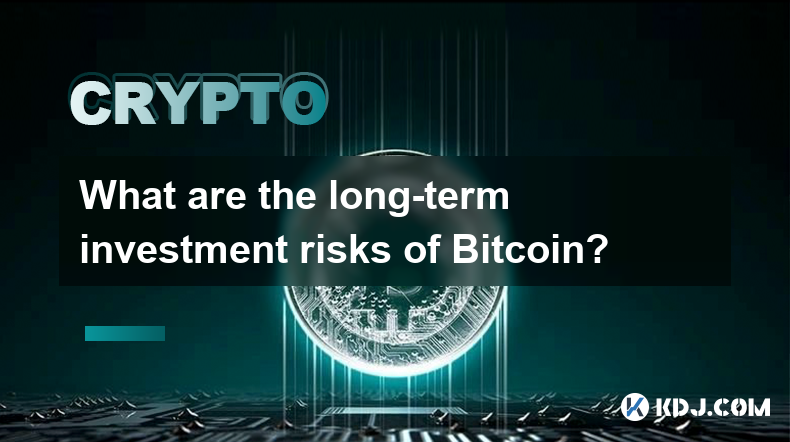
What are the long-term investment risks of Bitcoin?
Feb 22,2025 at 05:30pm
Key PointsVolatility and price fluctuationsRegulatory uncertaintySecurity risksCompetition from altcoinsMarket manipulation and scamsTransaction feesEnvironmental concernsLong-Term Investment Risks of BitcoinVolatility and Price FluctuationsBitcoin's high volatility is a double-edged sword. While it has the potential to generate substantial returns, it ...
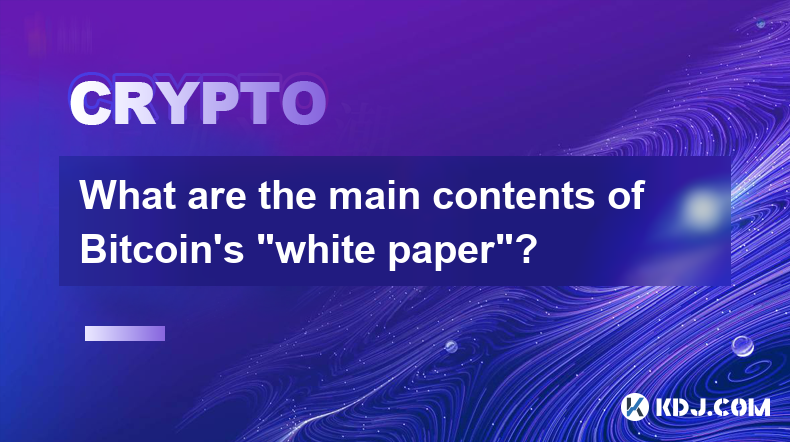
What are the main contents of Bitcoin's "white paper"?
Feb 21,2025 at 04:36am
Key Points:Understanding Bitcoin's Genesis: The White Paper's IntroductionA Decentralized Digital Currency: Bitcoin's Core ConceptBlockchain Technology: The Foundation of Bitcoin's Immutable LedgerProof-of-Work: Securing Bitcoin's NetworkThe Design of Bitcoin's Currency: Issuance, Scarcity, and DivisibilityBitcoin's Potential Applications and Future Pro...

How does Bitcoin's distributed ledger ensure consistency?
Feb 22,2025 at 10:06pm
Key Points:Bitcoin employs a distributed ledger, also known as a blockchain, to maintain a tamper-proof and consistent record of transactions.The blockchain is a decentralized network of computers that collectively validate and store transaction data.Bitcoin's distributed ledger ensures consistency through consensus mechanisms and cryptographic algorith...
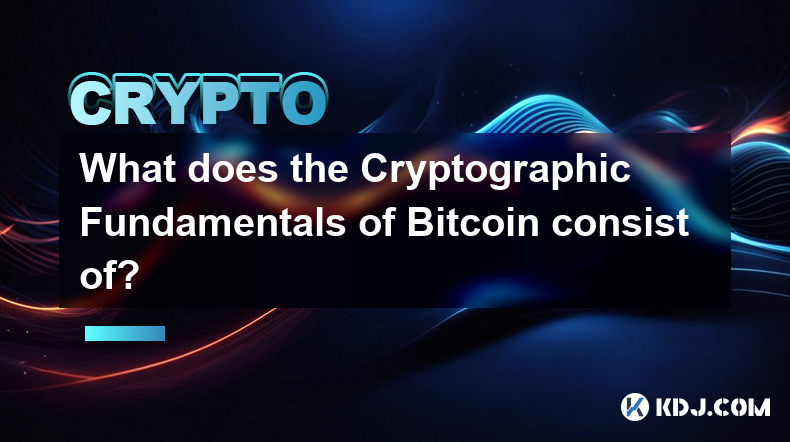
What does the Cryptographic Fundamentals of Bitcoin consist of?
Feb 21,2025 at 12:06pm
Key PointsUnderstanding the cryptographic algorithms used in BitcoinFamiliarization with the Bitcoin blockchain and its underlying mechanicsExamination of the security measures that protect Bitcoin from attackAnalysis of the decentralized nature of Bitcoin and its implicationsDiscussion of the scalability and transaction fee issues associated with Bitco...
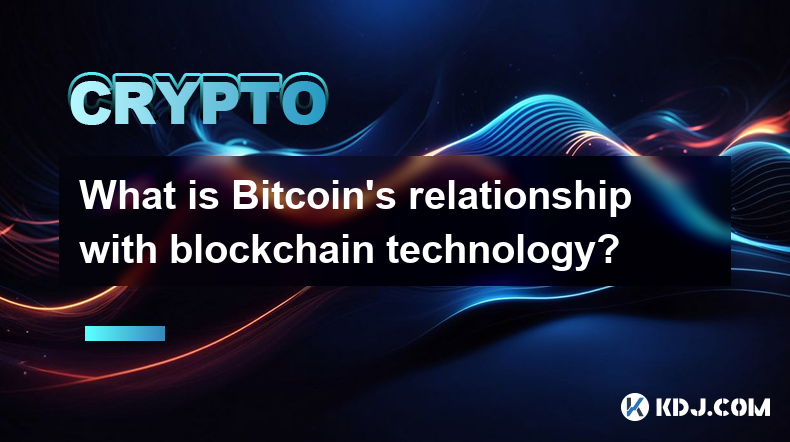
What is Bitcoin's relationship with blockchain technology?
Feb 22,2025 at 07:00pm
Bitcoin's Intertwined Relationship with Blockchain TechnologyKey Points:Definition of blockchain technology and its decentralized natureBitcoin's utilization of blockchain for secure and immutable transactionsThe role of blockchain in verifying and confirming transactionsEvolution of blockchain technology beyond Bitcoin's cryptocurrency applicationsUnde...
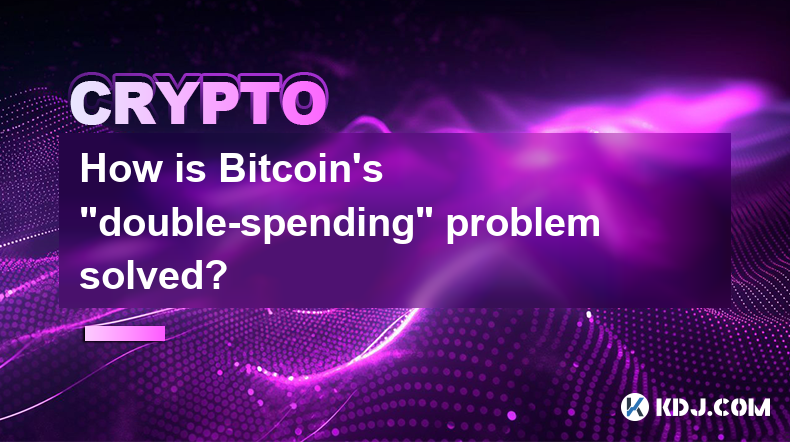
How is Bitcoin's "double-spending" problem solved?
Feb 23,2025 at 02:54am
Key Points:The double-spending problem refers to the potential for a digital currency transaction to be reversed, allowing the same funds to be spent multiple times.Bitcoin solves this problem through the use of a decentralized blockchain, a public ledger that records all transactions permanently and securely.The immutability and transparency of the blo...

What are the long-term investment risks of Bitcoin?
Feb 22,2025 at 05:30pm
Key PointsVolatility and price fluctuationsRegulatory uncertaintySecurity risksCompetition from altcoinsMarket manipulation and scamsTransaction feesEnvironmental concernsLong-Term Investment Risks of BitcoinVolatility and Price FluctuationsBitcoin's high volatility is a double-edged sword. While it has the potential to generate substantial returns, it ...

What are the main contents of Bitcoin's "white paper"?
Feb 21,2025 at 04:36am
Key Points:Understanding Bitcoin's Genesis: The White Paper's IntroductionA Decentralized Digital Currency: Bitcoin's Core ConceptBlockchain Technology: The Foundation of Bitcoin's Immutable LedgerProof-of-Work: Securing Bitcoin's NetworkThe Design of Bitcoin's Currency: Issuance, Scarcity, and DivisibilityBitcoin's Potential Applications and Future Pro...

How does Bitcoin's distributed ledger ensure consistency?
Feb 22,2025 at 10:06pm
Key Points:Bitcoin employs a distributed ledger, also known as a blockchain, to maintain a tamper-proof and consistent record of transactions.The blockchain is a decentralized network of computers that collectively validate and store transaction data.Bitcoin's distributed ledger ensures consistency through consensus mechanisms and cryptographic algorith...

What does the Cryptographic Fundamentals of Bitcoin consist of?
Feb 21,2025 at 12:06pm
Key PointsUnderstanding the cryptographic algorithms used in BitcoinFamiliarization with the Bitcoin blockchain and its underlying mechanicsExamination of the security measures that protect Bitcoin from attackAnalysis of the decentralized nature of Bitcoin and its implicationsDiscussion of the scalability and transaction fee issues associated with Bitco...

What is Bitcoin's relationship with blockchain technology?
Feb 22,2025 at 07:00pm
Bitcoin's Intertwined Relationship with Blockchain TechnologyKey Points:Definition of blockchain technology and its decentralized natureBitcoin's utilization of blockchain for secure and immutable transactionsThe role of blockchain in verifying and confirming transactionsEvolution of blockchain technology beyond Bitcoin's cryptocurrency applicationsUnde...

How is Bitcoin's "double-spending" problem solved?
Feb 23,2025 at 02:54am
Key Points:The double-spending problem refers to the potential for a digital currency transaction to be reversed, allowing the same funds to be spent multiple times.Bitcoin solves this problem through the use of a decentralized blockchain, a public ledger that records all transactions permanently and securely.The immutability and transparency of the blo...
See all articles

















































































